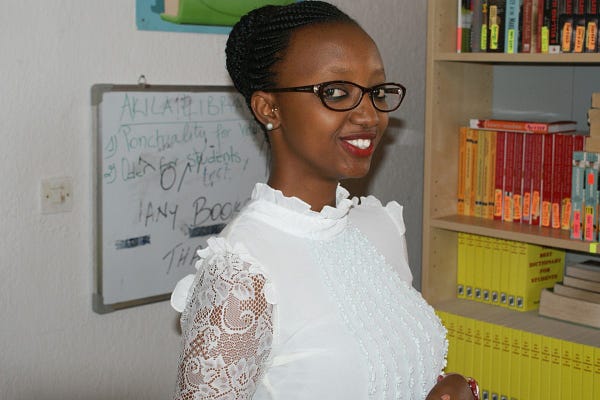Burundi and the Possibility of Infinite Returns
Author: Karen Sherman
Cross-posted from Huffington Post

Countries improve when they have a clear sense of purpose, new knowledge, a culture that is receptive to change, and leadership that comprehends all three. “I want Burundi to be like other countries, developed. These things that are happening now are holding us back,” said Ornella, a bright, 20 year old student at the Akilah Institute for Women, which was forced to close its campus on April 27th and has yet to reopen due to insecurity. “Once I finish my education, I can help Burundian people to develop themselves, and then they can help develop their country. I believe a woman who is educated can change everything.”
Ornella, who chose to study at Akilah “because it is the only institution in Burundi to help women,” is now living with friends in Rwanda; she and several of her classmates fled to Rwanda hoping to escape the violence plaguing their country. I had the chance to interview Ornella and several other students on a recent visit to Akilah’s campus in Kigali.
“I was hoping to be a bank manager, and later on, maybe create my own bank,” she said. Ornella and her fellow students were expected to be among Akilah’s first graduating class in Burundi. Now her dreams, and theirs, are on hold for the foreseeable future.
“It’s growing worse and worse,” she said anxiously. Her parents and brother, still in Burundi, share updates with her by phone twice a week. “It changes my mood when I think about them. I am very concerned.”
Indeed, the situation in Burundi is deteriorating. Reports of grenade attacks and explosions are widespread. Protests, many of them deadly, are rampant. Politically motivated disappearances and imprisonments appear to be on the rise. The economy has virtually ground to a halt. A month ago, the Burundi Franc exchanged at 1,500 to the dollar; today it is at 2,500 with no sign of stabilizing. Businesses throughout the capital are suffering and remain closed. Foreign aid, representing the majority of the country’s budget, has all but dried up. Most development organizations have pulled out.
The number of refugees in neighboring countries has topped 100,000 and continues to grow. Independent media functions sporadically. Now that parliamentary and presidential elections scheduled for this month are officially postponed, it is possible that violence may give way to an uneasy calm. But with tensions high and so much at stake, that seems more hopeful than likely.
Sarah, a classmate of Ornella’s, always wanted to study hospitality management. “I want to be my own boss, to have a big hotel, nicer than in Beverly Hills,” she asserted, pushing her long, red-streaked, braided hair away from her face. She is living at her auntie’s place in Gikondo, a neighborhood in Kigali, sent by her parents to wait out the fighting. When I asked about her wish for her country, she said: “Tell the President I want to go back to school.”
Lydia, looking very much the college student with a tiny nose piercing, gray jeans and over large silver cross, probably said it best: “It’s my time to study. I’m not doing what I’m supposed to do.” Elected in her first year as student guild president, she came to Rwanda expecting to stay just two weeks. During her last phone call with her parents, who chose to remain in Bujumbura, they told her and her brother and sister to stay put because they would be safer. “I want to see my family, go back to campus and, someday, open my own restaurant,” she said in frustration. “To me, education is everything. You can’t do anything without an education.”
All nations that change for the better have a clear sense of purpose: they fear falling behind, or repeating the mistakes of the past. Burundi’s purpose encompasses both of those and another one. One of the only investments with the possibility of infinite returns, is the investment in women. The President and the opposition in Burundi will most certainly sort out their ability to share power and improve democracy, but they should not do so at the expense of young women like Ornella, Sarah and Lydia.
Originally published at www.akilahinstitute.org on June 9, 2015.
